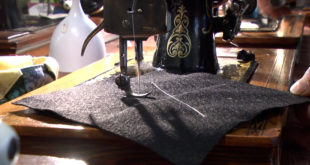Two advanced materials were selected to receive a combined $200,000 in funding to continue their path to commercialization through the new statewide Michigan Translational Research & Commercialization (MTRAC) Advanced Applied Materials Innovation Hub at Michigan Technological University.
The selected projects include a solid state ceramic battery technology proposed by the University of Michigan’s Dr. Travis Thompson and a nanowire organic sensor platform by Dr. Guangzhao Mao of Wayne State University. Thompson’s project is designed to fix shortcomings of current lithium-ion technology, including increasing energy density and removing the risk of fire. Dr. Mao’s project aims to develop an ammonia sensor out of organic nanowire, which should be able to detect parts per million levels of the dangerous, but common, industrial gas.
“We were extremely pleased with an initial response of 16 Letters of Intent from universities across the state, including Wayne State, University of Michigan, Michigan State, Michigan Tech, Eastern Michigan and Western Michigan,” said John Diebel, Michigan Tech MTRAC program director. “It is clear there is a lot of interest out there that can drive commercialization and further validates the need for this statewide program.”
The Advanced Applied Materials Innovation Hub is part of a statewide initiative, in partnership with the Michigan Economic Development Corporation (MEDC)’s Entrepreneurship and Innovation initiative, funding translational research and accelerating the creation and transfer of new technologies from institutions of higher education, hospital systems and nonprofit research centers.
“The MTRAC program is a key resource within our ecosystem helping support very early stage technology that is developed at universities across the state of Michigan,” said Denise Graves MEDC University Relations Director. “The variety of applicants for this first round of Michigan Tech’s statewide funding demonstrates the expertise in and demand for advanced materials technologies and innovations.”
Projects are selected following a three-stage review process by the program Oversight Committee, consisting of industry experts statewide engaged in material science along with private investment fund managers. Other committee members represent some of the state’s largest manufacturers of polymer based products, stationary energy storage devices and miniaturized electronic devices.
Michigan Tech is one of four universities with an MTRAC program, joining Michigan State, U-M, and Wayne State. Each university focuses on a different industry, including agriculture biology, applied advanced materials, life sciences, advanced transportation and biomedical.
In collaboration with the host universities, supported by the Michigan Strategic Fund and managed by the MEDC Entrepreneurship and Innovation initiative, MTRAC programs to-date have funded 134 projects, helped develop 21 start-up companies, created 54 jobs, secured $72.8M in follow-on funding, and licensed technology to 17 industry partners.
In the three years since the Applied Advanced Materials MTRAC program began at Michigan Tech it has received a total of 37 proposals and funded 12 projects. MEDC’s program investment of $503,890 in award funding at Michigan Tech has returned $6,584,877 in follow-on funding, created 12 jobs, 3 startup companies and 3 technology licenses.
Funding for the new projects begins August 2017 and runs through August 2018. The Innovation Hub will accept new applications for the advanced materials program beginning in January 2018.
MEDC’s Entrepreneurship and Innovation initiative establishes Michigan as the place to create and grow a business by providing high-tech start-up companies with access to a variety of critical resources, such as funding and expert counsel, from ideation to maturation. For more on MEDC Entrepreneurship & Innovation visit michiganbusiness.org.
 Keweenaw Report Your Source for Local News and Sports
Keweenaw Report Your Source for Local News and Sports





